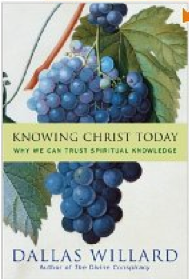I recently read an excellent book, which I’ll be discussing more in a subsequent post, titled Knowing Christ Today: Why we can trust spiritual knowledge, by Dallas Willard.
The book is about the idea that true knowledge is not bounded solely by the scientific method, and that we can know other things as surely as we know things from a scientific perspective. It’s an excellent work, and it calls us to rethink the abdication by too many in the intelligentsia from claiming to “know” anything that matters with any high degree of confidence. It is, in a sense, a book about authority. Who has the right to say that they know a thing? What does it mean to know a thing, and what responsibilities are incumbent on a person who knows? Willard situates the idea of what it means to “know Christ” in the larger context of knowledge that is not merely “scientific.”
In some sense, the Protestant Reformation was partly about who has the right to claim to “know” something about God, and to act is if they have true knowledge of Him. Yet this carried with it some problems of its own, as explained by Fr. Barron in this video.
h/t: Francis Beckwith
Where does this leave us? The Roman Catholic church was so certain of its authority to determine Truth that it had little qualm about executing heretics. Even the Protestant John Calvin participated in such a thing. It’s difficult to see how the claim to knowledge of God justified the murder of those who merely disagreed. To extend Fr. Barron’s analogy, referees aren’t allowed to shoot players on whom they call a technical foul.
Roman Catholic abuses of power and improperly made claims of knowledge were part of the fuel for the Protestant Reformation. However, when they’ve had too much political power, Protestants haven’t always done much better. The Roman church has occasionally apologized for past excesses done in the name of its knowledge of God, but has perhaps not always grappled with the cognitive dissonance of claiming historical, apostolic authority, while simultaneously denying the rightness of some of its applications. In the name of knowledge of God, Protestants have too often allowed themselves to be divided over matters that are not central to how we should live, and what the nature of our relationships to others should be. Even larger issues like free will and predestination have little discernible impact on the day to day life of believers, who all live as if they have free will, but hope God has plans for them.
This history is part of what’s behind the fear of claims of spiritual knowledge. People are, with some justification, a touch nervous about anyone who claims to really know God. In the past, such people have sometimes been those who were willing to kill to enforce their perspective. But, in modern times, other than the case of Islam, such fear is almost totally a smokescreen.
These days, most resistance to the idea that we can have true knowledge of God is from people who are afraid of the claims such knowledge will make on their lives.
If some things really are true, then we must live differently.



